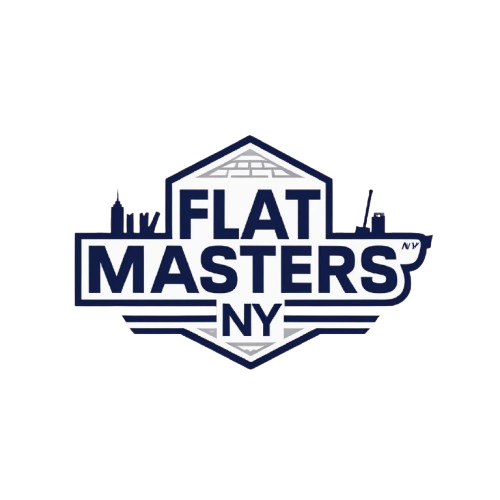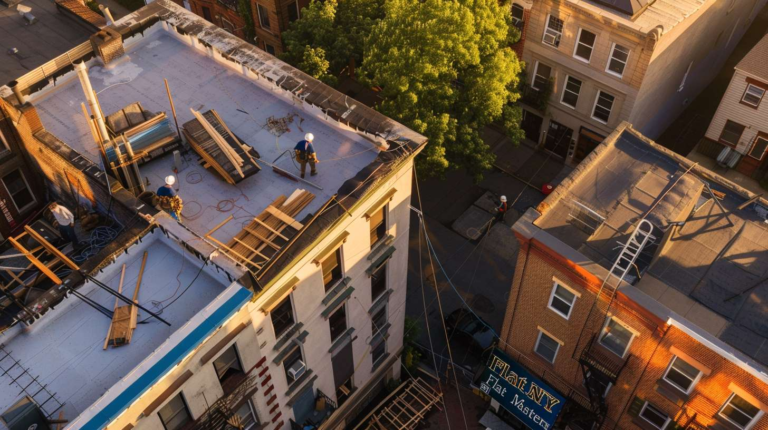Professional Flat Roof Sheet Materials Installation & Repair
After twenty-three years installing flat roofs across Queens, I can tell you one thing with absolute certainty - the sheet material you choose will make or break your roof's performance. Just last month on Northern Boulevard, we had to completely tear off a rubber roof that was installed incorrectly three years ago. The homeowner thought they were saving money. They weren't.
Understanding Flat Roof Sheet Materials: The Real Story
Look, when contractors talk about flat roof sheet materials, they're usually referring to single-ply membranes - EPDM rubber, TPO, and PVC. These are the workhorses of the flat roofing industry, and each one has its place in Queens' challenging climate. But here's what most people don't understand: it's not just about the material itself, it's about proper installation and knowing which material works best for your specific situation.
EPDM (ethylene propylene diene monomer) is what most folks call "rubber roofing." It's been around since the 1960s and honestly, it's still one of my go-to materials for residential applications. The stuff is incredibly durable - I've got customers in Astoria whose EPDM roofs are pushing thirty years and still going strong. The key is getting it installed right the first time.
TPO: The Modern Choice for Flat Roofs
TPO (thermoplastic polyolefin) has become incredibly popular over the last fifteen years, and for good reason. This white membrane reflects heat like nobody's business, which is crucial here in Queens where summer temperatures can make your top floor unbearable. The seams are heat-welded, creating a watertight seal that's stronger than the membrane itself when done correctly.
But here's where I see contractors mess up constantly - they rush the welding process. Last Tuesday, we were called out to fix a TPO installation in Elmhurst where the previous contractor had cold welds throughout the entire roof. Water was getting in everywhere. The homeowner ended up paying twice - once for the botched job and again to have Flat Masters NY fix it properly.
TPO typically runs between $7-12 per square foot installed, depending on the thickness and complexity of your roof. We usually recommend 60-mil thickness for most residential applications in Queens because of the foot traffic and debris from the surrounding trees.
PVC Roofing: Premium Performance
PVC is the Cadillac of roofing sheets for flat roof applications. It's more expensive - usually $10-16 per square foot installed - but it offers superior chemical resistance and fire performance. If you've got a commercial kitchen exhaust or any industrial applications, PVC is often your only real choice.
The installation process is similar to TPO with heat welding, but PVC requires more precision. The material is less forgiving than TPO, and you need an experienced crew to handle it properly. I've been working with the same supplier on Northern Boulevard for over a decade, and they always stock the quality PVC membranes we need.
Modified Bitumen: The Traditional Approach
Modified bitumen isn't technically a single sheet material - it's usually applied in multiple layers - but it deserves mention because it's still widely used across Queens. This stuff is basically asphalt that's been modified with rubber or plastic polymers to make it more flexible and durable.
The installation involves either torching or using hot asphalt to adhere the sheets. It's labor-intensive, but when done right, modified bitumen can last 20+ years easily. We installed a modified bitumen system on a warehouse in Long Island City back in 2008, and it's still performing flawlessly.
Material Selection: What Really Matters
So what's really the best flat roof material? Here's the thing - there's no universal answer. Your building's specific conditions, budget, and intended use all factor into the decision. A residential application in Flushing might call for EPDM, while a commercial building in Astoria could benefit from PVC.
Climate considerations are huge here in Queens. We get everything from blazing summers to freezing winters, plus the occasional hurricane. The salt air from the East River and Long Island Sound adds another layer of complexity. Materials that perform well in Arizona might fail miserably here.
I always tell customers to consider the total cost of ownership, not just the upfront installation cost. A cheaper material that needs replacement in ten years isn't actually cheaper than a premium material that lasts thirty years.
Installation Quality: Why It Matters More Than Material Choice
I can't tell you how many times I've seen expensive materials fail because of poor installation. The best flat roof sheet materials in the world won't perform if they're not installed correctly. Proper substrate preparation, correct fastening patterns, and quality seaming are absolutely critical.
Base preparation is where most problems start. The deck needs to be clean, dry, and properly sloped for drainage. Even a perfectly flat roof needs subtle slopes to direct water to the drains. We typically create slopes using tapered insulation systems, but some contractors try to skip this step to save money. Big mistake.
Seam quality is another make-or-break factor. Whether you're dealing with adhered EPDM seams or heat-welded TPO joints, every linear foot of seam is a potential failure point. Our crews test every seam with specialized equipment before we consider a job complete.
Maintenance and Longevity Expectations
Every flat roof material requires maintenance, period. Anyone who tells you otherwise is either lying or doesn't know what they're talking about. The good news is that proper maintenance can extend the life of any roof system significantly.
EPDM typically needs seam inspection and minor repairs every 3-5 years. TPO and PVC are generally more maintenance-friendly, but they still need regular inspection for punctures and seam integrity. We recommend annual inspections for all our flat roof installations, usually in the spring after the harsh winter weather.
Ponding water is the enemy of all flat roof materials. If water sits on your roof for more than 48 hours after a rain event, you've got drainage issues that need addressing. I've seen expensive PVC roofs fail prematurely because of chronic ponding that could have been fixed with proper drainage modifications.
Local Considerations for Queens Installations
Working in Queens presents unique challenges that affect material selection. The dense urban environment means limited access for equipment and materials. We often have to crane materials onto rooftops or carry them up multiple flights of stairs, which can impact both cost and material choice.
Local building codes also play a role. NYC has specific requirements for wind uplift resistance and fire ratings that might dictate your material options. We stay current with all local code requirements and work with the Department of Buildings regularly to ensure compliance.
The diverse architecture across Queens neighborhoods also influences material selection. A pre-war building in Jackson Heights has different requirements than a new construction in Long Island City. We take building age, existing conditions, and architectural constraints into account for every project.
Cost Considerations and Value Engineering
Material costs fluctuate based on oil prices, manufacturing capacity, and demand, but here's what you can generally expect for quality installations in Queens:
- EPDM: $8-14 per square foot installed
- TPO: $9-15 per square foot installed
- PVC: $12-18 per square foot installed
- Modified Bitumen: $10-16 per square foot installed
These prices include removal of existing roofing, proper insulation, and warranty coverage. Beware of contractors offering significantly lower prices - they're usually cutting corners somewhere, whether it's material quality, installation standards, or proper insurance coverage.
Value engineering isn't about choosing the cheapest option - it's about optimizing performance for your specific application and budget. Sometimes that means upgrading to a premium material, other times it means investing in better insulation or drainage improvements.
Why Flat Masters NY for Your Roofing Project
We've been installing and repairing flat roofs across Queens since 2001, and we've seen every type of installation challenge you can imagine. Our team holds all the necessary licenses and certifications, and we maintain relationships with the top material manufacturers to ensure we're always using current best practices.
What sets us apart is our commitment to doing things right the first time. We don't take shortcuts on substrate preparation, we don't rush seaming operations, and we stand behind our work with comprehensive warranties. When you call Flat Masters NY at (917) 994-7618, you're getting a team that understands both the technical requirements and local challenges of flat roof installation in Queens.
Every project starts with a detailed assessment of your existing conditions and requirements. We'll explain your material options honestly, discuss the pros and cons of each choice, and provide detailed written estimates with no hidden costs.
Because at the end of the day, your roof isn't just about keeping the water out - it's about protecting your investment and giving you peace of mind for years to come.


